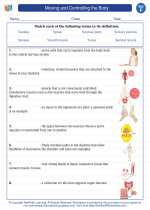Temperature
What is Temperature?
Temperature is a measure of how hot or cold something is. It is a physical quantity that expresses the amount of heat energy in a substance. Temperature is typically measured using a thermometer and is expressed in units such as degrees Celsius (°C) or degrees Fahrenheit (°F).
Temperature Scales
There are several temperature scales used around the world, but the most common ones are the Celsius and Fahrenheit scales. The Celsius scale is based on the freezing and boiling points of water, while the Fahrenheit scale is based on a mixture of ice, water, and salt. Another scale used in scientific research is the Kelvin scale, which is based on absolute zero, the theoretical lowest possible temperature.
Effects of Temperature
Temperature can have various effects on different materials and substances. For example, high temperatures can cause substances to expand, while low temperatures can cause them to contract. Temperature also affects the states of matter, causing substances to change from solid to liquid to gas as the temperature increases.
Measuring Temperature
Temperature is measured using devices called thermometers. There are different types of thermometers, including mercury, digital, and infrared thermometers. These devices work based on the principle that certain materials expand or contract with changes in temperature, allowing the measurement of the temperature based on the scale on the thermometer.
Temperature in Daily Life
Temperature plays a crucial role in our daily lives. It affects the weather, cooking, and the functioning of various devices and systems. Understanding temperature is important for activities such as cooking, maintaining a comfortable living environment, and even in medical applications.
Study Guide Questions
- What is temperature and how is it measured?
- Explain the differences between the Celsius, Fahrenheit, and Kelvin temperature scales.
- How does temperature affect the behavior of different materials?
- Discuss the importance of understanding temperature in daily life.
[Temperature] Related Worksheets and Study Guides:
.◂Science Worksheets and Study Guides Sixth Grade. Moving and Controlling the Body
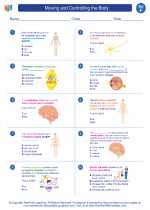
 Worksheet/Answer key
Worksheet/Answer key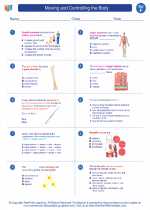
 Worksheet/Answer key
Worksheet/Answer key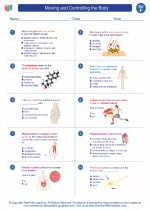
 Vocabulary/Answer key
Vocabulary/Answer key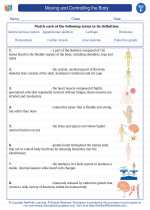
 Vocabulary/Answer key
Vocabulary/Answer key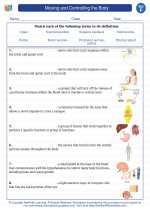
 Vocabulary/Answer key
Vocabulary/Answer key